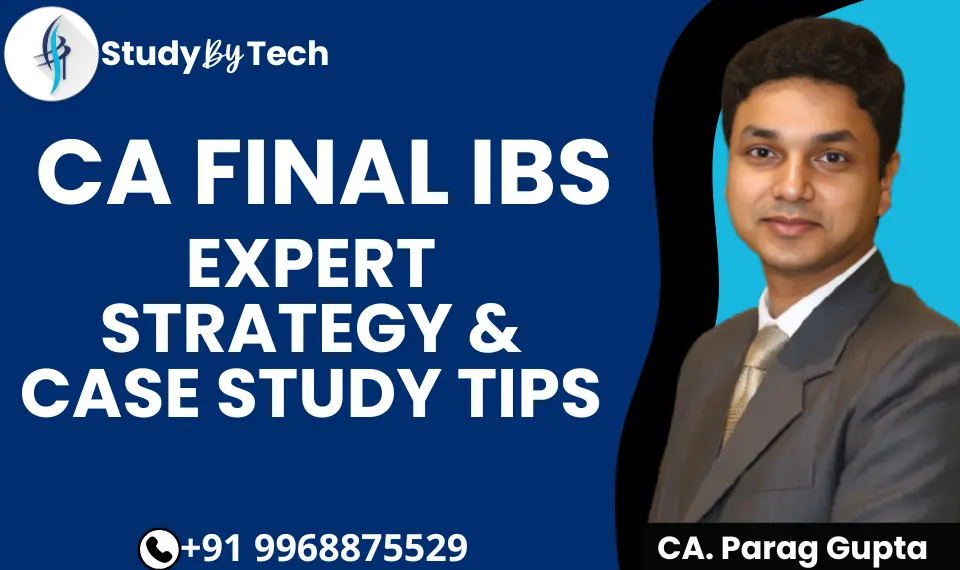CA Final IBS – Expert Strategy & Case Study Tips by Parag Sir
What is CA Final IBS?
CA Final IBS (Integrated Business Solutions), is quite difficult in nature with its long case studies that do not only need the technical knowledge but the strategic thinking too. The powerful part of the curriculum is the application of knowledge through case studies of all CA Final subjects, be it from self-paced online modules, or CA Final Group 1 subjects or CA Final Group 2 subjects. So this exam actually tests your applicability of all subjects in 1 exam.
This blog is by CA Parag Gupta who is a well-known faculty in the CA Final SCPM(SPOM-set B). He has come up with a couple of ideas that can help you manage the long case studies in the CA Final IBS paper.
The Council has decided that the duration of the examination of this paper would continue to be four hours and the manner of assessment of this paper would also be 40% by way of MCQs and 60% in the form of Descriptive Questions in each case study of 25 marks. Accordingly, there will be five case studies of 25 marks each out of which students will be required to attempt any four.
Quick Tips for Long Case Studies | CA Final IBS | CA Parag Gupta:
Why CA Parag Gupta is the Best Mentor for CA Final IBS?
Parag Gupta sir is considered the most experienced and most recommended faculties amongst CA students. With his 2 decades of teaching experience as CA Inter Costing SM and CA Final SCPM(SPOM-set B) & IBS(SCPM portion), he has always helped & guided lakhs of students to achieve their goal of becoming CA.
After every few years, ICAI make changes in syllabus and pattern of exams, which always confused CA students. Everytime, CA Parag Gupta sir’s guidelines has being the most helpful guide. His years of analysis and experience has helped him to understand how the course is evolving and how ICAI is actually thinking to take the examination and evaluation process.
CA Final IBS May 25 Exam review:
Break Down the Questions
The initial stage in solving any long case study is to correctly comprehend the scenario. Frequently, scholars question their understanding of the case itself, which eventually leads to errors and confusion further in. Here are the ten essential steps to follow when working on the case:
- Please, read the case in full first. Try to find the underlying problem or issue that is being discussed. It might be about pricing decisions, cost reduction strategies, performance evaluation, or risk management.
- Draw attention to important information. Keep on track of essential figures, crucial business targets, and the toughest points you deal with; you can make use of such data to refer to them in the course of your work.
- Emphasize the business goals. Get to know what the larger picture of the business is—what does it demand? This will guide you in the analysis and the recommendations.
One important step that should not be missed is to comprehend the whole case before moving on to the set of questions. In the in IBS paper, a large number of questions are composed of different parts and involve detailed analysis. Follow these steps:
- Split up the problem into sub-problems. Make a decision whether the question asks you to perform a financial analysis, suggest strategic recommendations, or a combination of both
- Importance. Concentrate on the questions that will earn more marks or you believe that you can answer easily to begin with. Examinations are time-bound, and the challenge is to make sure you get through all topics by the time it is up and also to get through them when you have already gained some speed with the simpler questions.
CA Final IBS | How to Solve Case Studies (70+ Strategy) by Parag Sir:
IBS Case Study Strategy
The IBS paper deliberated over the management of strategic cost where cost management and decision making, performance measurement, and cost control are examined. By applying a framework, it is possible to follow a schedule to approach a case study. Several such concepts might be useful:
- SWOT Analysis for identifying strengths, weaknesses, opportunities, and threats.
- Porter’s Five Forces for analyzing forces that govern industry competition.
- Balanced Scorecard for the evaluation of performance along with financial and non-financial measures.
Applying the use of these frameworks demonstrates to the examiner the fact that you are strategic in your mindset and you are not just working with numbers. Also, these frameworks help you in the way that they enable you to break the masses of information down into smaller parts which you can easier manage.
Common Mistakes in IBS Exam & How to Avoid Them
One can be tempted to retell the case study’s information, but instead, examiners are looking for original independent analysis. Utilise information provided to:
- Evaluation of options and alternatives. While making recommendations, in consideration of all potential solutions, deliberation of the sides of the case should be the primary focus.
- Use numbers in an accurate way. Quantitative analysis stands central. Support your recommendations with such financial math as break-even point, ROI, and cost-benefit analysis are options that are situation-dependent.
Structure Your Answer Well
Understanding is what plays a major role in lengthy case studies. Even with a perfect analysis, an improperly structured answer can lead the examiner to question your thoughts. The answers have always had to be structured as follows:
- Introduction: Outline the main problem or decision to be made.
- Body: Put forth your analysis, using the appropriate theories or models, and do calculations if necessary.
Time Management
Long case studies can be time-consuming, yet make sure they don’t take up all your exam time. Set a specific amount of time for each question, and if time is running down you should go to the next one. You are still able to revisit the question later if necessary.
Conclusion
To deal with these types of scenarios with the CA Final IBS paper, one must have a structured approach, logical analysis and good time management skills. This way, you can handle the exam even if there is a really difficult question, confidently and increase your marks also.
FAQ’s
SPOM comprises four sets – Set A (Corporate and Economic Laws) and Set B (Strategic Cost & Performance Management) are compulsory for all students. Set C provides 10 elective subjects such as Risk Management, Sustainable Development, International Taxation. Set D comprises 4 multidisciplinary courses such as Constitution of India, Entrepreneurship, Psychology, and Digital Ecosystem. Parag sir’s lectures of Set B (Strategic Cost & Performance Management) are thorough in nature, explaining difficult costing & Strategic management principles simple manner.
Yes, it is mandatory to complete all four modules of SPOM to be eligible for CA Final exams. You have to clear at least 50% marks in each module. ICAI has implemented this as a hard and fast rule from recent batches, so you should clear SPOM as the first priority before attempting CA Final.
Yes, IBS Paper 6 is an open book exam. As per ICAI’s official notification, Final Paper 6: Integrated Business Solutions is an open book and case study-based examination. You are allowed to bring all your subject materials, ICAI modules, concept notes, and question banks to the exam.
IBS is Paper 6: Integrated Business Solutions – a mandatory multidisciplinary case study paper for CA Final Group 2. It integrates all seven subjects of the earlier CA syllabus into integrated business situations. The paper tests students’ skills in analyzing intricate business situations and offering complete solutions.

